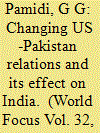| Srl | Item |
| 1 |
ID:
109727


|
|
|
| 2 |
ID:
155500


|
|
|
|
|
| Summary/Abstract |
Americans think the US foreign aid budget is far too generous. Can information change those views? We identified ten prominent arguments about aid in public discussion, five positive and five negative. In a survey experiment, we exposed respondents to one of those arguments with five associated facts. Most of the arguments in favor of aid made respondents more supportive, while most of the arguments against aid made them less supportive. Arguments that focused either positively or negatively on economic development in recipient countries or advancing US interests made little difference. In contrast, arguments about the domestic costs of foreign aid or those that invoked moral considerations like recipient need or corruption had fairly large effects on attitudes. The most successful argument, on the low cost of aid, reduced aid opposition from 67 to 28 percent. When respondents saw both pro and con arguments together, however, arguments generally lost their efficacy. The only exception was the argument about the low cost of aid, which altered opinions in some ways—even when countered with anti-aid arguments. Our results are somewhat surprising given the conventional wisdom that people are motivated reasoners who reject new information that does not conform to their worldview.
|
|
|
|
|
|
|
|
|
|
|
|
|
|
|
|
| 3 |
ID:
099117


|
|
|
|
|
| Publication |
2010.
|
| Summary/Abstract |
This article is designed to explore the usefulness of an alternative conceptualization of the foreign assistance policy process. The common assumption is that US foreign aid outputs are rationally determined in response to external stimuli such as US security or economic interests or human need in a country. Yet, consistent with the logic of two-level games, foreign aid policy can become ensnared in domestic politics, especially those of a partisan distinction. In this article, I build an interactive model of foreign policy where external stimuli and domestic partisan differences are coupled to explain foreign assistance behavior toward Africa over the fiscal 1982-2003 period. I find that shifts in party control of the Presidency and the Congress lead to different valuations of the importance of external factors in making economic assistance policy. This interaction of domestic and foreign inputs serves to offer a fundamental reassessment of explanations concerning foreign assistance policy specifically, and foreign policy generally.
|
|
|
|
|
|
|
|
|
|
|
|
|
|
|
|
| 4 |
ID:
167879


|
|
|
|
|
| Summary/Abstract |
We theorize that foreign aid relationships influence both the effectiveness of economic sanctions threats and the aggressiveness of senders in imposing sanctions. Aid sanctions are generally far less costly for senders than imposing commercially oriented sanctions but can still be very costly for their targets. Being able to disrupt aid flows as part of potential sanctions enhances sender states’ credibility that they will impose painful sanctions against resisting target states. The more foreign aid a sender provides to a target state, the more successful we expect its sanctions threats to be and the more aggressive we expect the sender to be in imposing sanctions if the target resists. We test our theory using a competing risks analysis of ongoing, politically motivated sanctions threats issued by the United States from 1960–2010. Our analyses support our theory by revealing that the more foreign aid that the United States provides to target states, the more likely US sanctions threats are to succeed and the more aggressive the United States becomes in imposing sanctions.
|
|
|
|
|
|
|
|
|
|
|
|
|
|
|
|